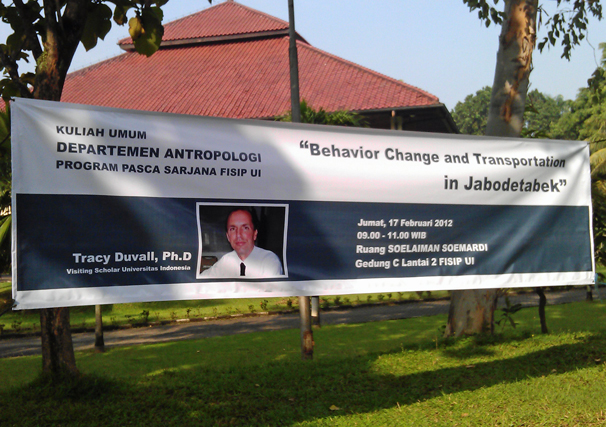 Last night, accompanying my spouse, I went to my first official function at the Indonesian Embassy in Washington, DC. It sounds gala – and I was wearing my suit – but the experience was less imposing than I had expected such events to be.
Last night, accompanying my spouse, I went to my first official function at the Indonesian Embassy in Washington, DC. It sounds gala – and I was wearing my suit – but the experience was less imposing than I had expected such events to be.
Here are some observations:
Lots of Java: Everyone whom I’ve met so far is from Java. I wonder whether this regional dominance extends throughout the government and, if so, how Indonesians feel about this pattern. Along these lines, when I asked one official whether he were Javanese, he hesitated and then responded that he was, “officially”; he seemed to imply that, more deeply, he was Indonesian.
 Man’s world?: I can imagine that females in the foreign service face continual obstacles in many countries. Almost everyone representing Indonesia was male, and, if my experience is representative, it’s easier for males to strike up a conversation with each other. I say this because, as mere arm-candy with poor language skills, I made no attempt at first to converse with my hosts. Just show me the food line! But, without seeking it, I ended up speaking with the ambassador, the second in command, and others.
Man’s world?: I can imagine that females in the foreign service face continual obstacles in many countries. Almost everyone representing Indonesia was male, and, if my experience is representative, it’s easier for males to strike up a conversation with each other. I say this because, as mere arm-candy with poor language skills, I made no attempt at first to converse with my hosts. Just show me the food line! But, without seeking it, I ended up speaking with the ambassador, the second in command, and others.
Saya tidak bicara bahasa indonesia: I’m learning to speak Indonesian, but I’m not there yet. So, at my big opportunity when the ambassador started conversing with me, my main statement was, in Indonesian, “I don’t speak Indonesian.” Next time!
The ambassador certainly does speak the language. I listened to his speech and picked out the occasional word that Rosetta Stone has thus far lodged into my brain. I hope that he didn’t say anything appalling, because I clapped when everyone else did. (I can imagine myself at the German embassy in the 1930s: “Heil, Hitler! Whatever that means.”) Actually, he seemed quite nice and even made sure that I put the correct sauce on my skewered chicken.
Earn this: It appeared that many of the U.S. visitors did not maximize this opportunity to learn and make connections. Instead, they ate and spoke with each other or had brief, pro forma exchanges with their Indonesian colleagues. Kudos to those who earned their chicken and vegetables – and their tax-paid salaries – by practicing their Indonesian and having real conversations with Indonesians.
Sober reflections: Maybe alcohol would have made conversation easier. But the hardest drink in the room was Coke. As someone who drinks alcohol rarely, I say, “Ha!”
 Rumah tua pretty: The embassy has two parts, one of which is in an old mansion. Visitors can go on scheduled tours of the house, which I recommend. A couple of times in the past, I had wandered through the building in the semi-darkness a couple of times to practice with a gamelan, but it has some delightful features that require lighting to appreciate fully.
Rumah tua pretty: The embassy has two parts, one of which is in an old mansion. Visitors can go on scheduled tours of the house, which I recommend. A couple of times in the past, I had wandered through the building in the semi-darkness a couple of times to practice with a gamelan, but it has some delightful features that require lighting to appreciate fully.
Changing Transportation Behaviors in Jakarta


 I recently read a research article on how Indonesian schools treat students who misbehave. The author raises and unfortunately mangles the guilt/shame contrast, but the whole exercise provoked me into thinking about the expectations that Indonesians display when someone faces accusations of wrongdoing. In short, displays of guilt or shame are in short supply; instead, criminals or the accused try an incredible variety of tactics, many of them public, to avoid responsibility. I’m searching for the one word, equivalent to guilt or shame, that can encapsulate this phenomenon.
I recently read a research article on how Indonesian schools treat students who misbehave. The author raises and unfortunately mangles the guilt/shame contrast, but the whole exercise provoked me into thinking about the expectations that Indonesians display when someone faces accusations of wrongdoing. In short, displays of guilt or shame are in short supply; instead, criminals or the accused try an incredible variety of tactics, many of them public, to avoid responsibility. I’m searching for the one word, equivalent to guilt or shame, that can encapsulate this phenomenon.

